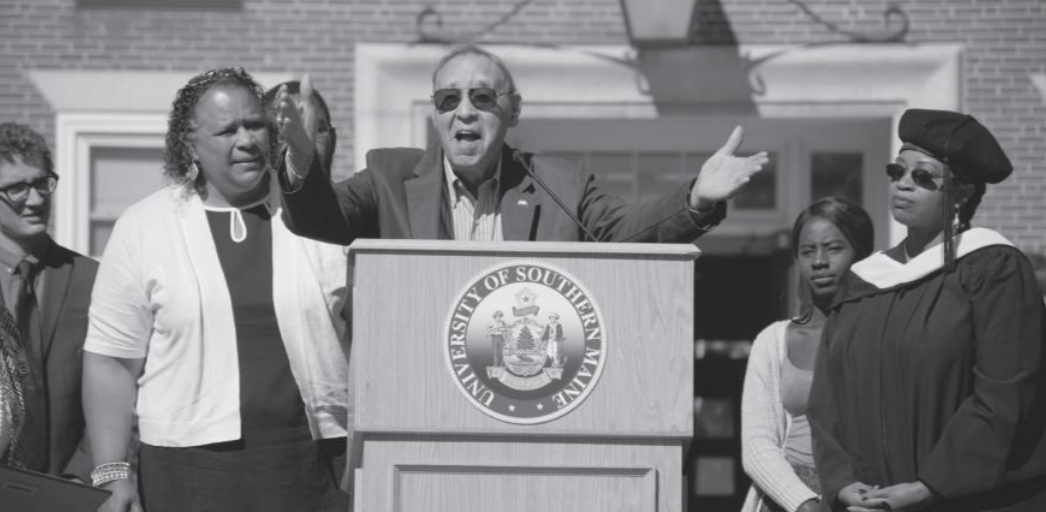By: Kate Rogers, Staff Writer
Friday morning on the lawn in front of Payson Smith Hall, USM student Mariana Angelo led hundreds of audience members in a chant adopted and used by protestors across America, “It is our duty to fight for our freedom. It is our duty to win. We must love each other and support each other. We have nothing to lose but our chains.” Leaning against the front of the podium was a sign placed there by a mystery student, with the words “Black Lives Matter” printed clearly on it.
This was the kickoff for the 2017 Convocation at USM. Convocation is a faculty-led initiative in which every three to five years a theme is chosen and events following the theme occur throughout the year. It was started when USM Professor Gloria S. Duclos was appointed to the Walter E. Russell Endowed Chair in 1981 and put the money given to her towards a fund that USM uses now for convocation. Over the years convocation has covered themes like The Age of The Computer in 1983, Arts in Our Lives in 1986, and Religion and the Human Experience in 1999.
According to Provost Jeannine Uzzi, the goal of Convocation is to start a conversation and promote public debate. In President Cummings’ introductory speech on Friday, he called it a “great convening.” Convocation invites students, community, scholars and experts from all over America to be a part of the dialogue.
The theme for this year, proposed by Honors Program Director Rebecca Nisetich and African American history professor Leroy Rowe, is race and participatory democracy. “This convocation theme responds to a national conversation,” said Uzzi when asked about the importance of the subject. Talking about the social environment in America under Trump’s presidency, she said that, “Expressions of racism are not new, they’ve always been there but now people are feeling empowered to express them…now we can’t pretend that we are post racism. We have to address it and this is one way to do it.”
In his first speech during the event, Cummings discussed the steps USM has taken and is currently taking towards equality, mentioning gender-neutral bathrooms and expansions to the multicultural center. Nisetich and Rowe then framed the theme. Both of them spoke about everyone as individuals putting aside differences and trying to understand others. Rowe told the audience, “From time to time our democracy requires fixing…we each have a responsibility.”
Four USM students were invited to the podium next. The first was Mariana Angelo, a sociology major. She bluntly called out USM for allowing racism to take place on campus, recounting one of her own experiences and saying, “This university has failed us.” To her fellow people of color she offered words of encouragement, saying “you are magic, and the sun rises and falls on you.” She ended with the aforementioned chant, bringing the entire crowd together.
After Angelo, U.S. Marine and political science major Omar Andrews talked about meeting with Governor Lepage and putting aside their differences in agreement over a student loan bill. Marketing major Joe Menard discussed using white privilege as a tool to fight back against white supremacy and a way to provide resources to people of color. Finally, chemistry major Pamela Jean Keehn spoke of the Native American community and the struggle to make their voices heard in America. “If our concerns aren’t addressed, there is no hope for change,” Keehn said. On the further importance of this convocation, Keehn ended by saying, “There are people out there willing to listen if we are willing to speak up.”
Following the student speakers, Robin Talbot spoke on the importance of community in helping build a better society. Once she had spoken, Cummings presented an award to her parents Gerald and Anita Talbot. Gerald and Anita have been civil rights activists since the 1960s and Gerald was both the first African American elected to the Maine House of Representatives in 1972 and the first president of the NAACP in Portland. The award was given to recognize them both for their immense contributions to human rights progress in Maine.
The keynote speaker for the event was Dówóti Désir. Désir has a master’s degree in Contemporary Art and Critical theory from Bard college, is an expert for the International Slavery Museum Conference and is a chairperson for the AfroAtlantic Theologies & Treaties Institute. In her speech Désir focused on how democracy is in danger in America and citizens’ part in repairing it. She praised Convocation for giving voice to, in her words, “Our collective vision as activists.” Concerning the audience’s responsibility, she continued by saying, “And yes, activists whether or not you know that you are…you define a space of engagement brimming with the agency to change what happens to yourselves and fellow citizens, documented and undocumented.”
Convocation at USM in 2017 is a call to action, both to the individual and to the collective to put aside their differences and make their voices heard. The calendar of Convocation events can be found on the school website and includes numerous panels, keynotes and film series. According to Nisetich, music and art and culture will also be a huge part of the events.
“What we are hoping is that convocation gives the university and the greater Portland community an opportunity to learn more…and to think more critically,” Nisetich said.

